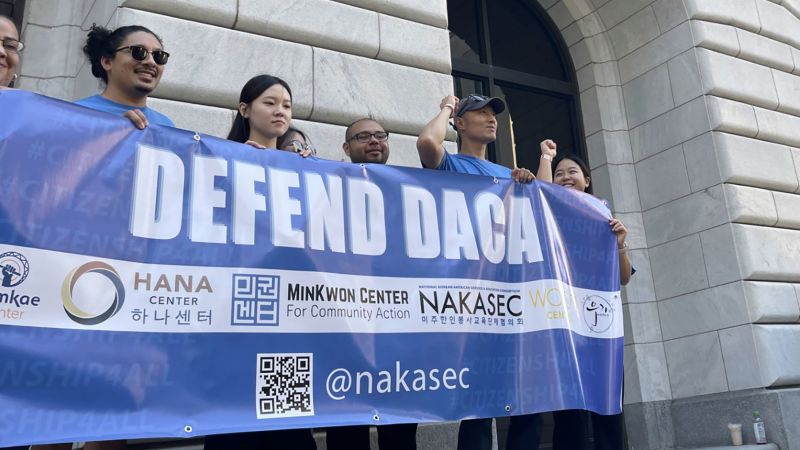
Federal appeals court is skeptical of DACA but could narrow the ruling striking it down
Posted on 10/10/2024

A federal appeals court appeared unlikely to fully reverse a judge’s ruling that would end the immigration program known as DACA, which protects undocumented immigrants who were brought to the United States as minors.
However, at a hearing Thursday in New Orleans, judges on the conservative 5th US Circuit Court of Appeals asked questions suggesting openness to letting parts of the program survive.
The hearing is the latest episode in a six-year legal battle over the Deferred Action for Childhood Arrivals program, which was first put in place in 2012 under the Obama administration.
Texas – joined by eight other states – alleges that the program has harmed their states due to the public health care and educational spending that goes to DACA recipients, claiming that those noncitizens would self-exile if the program was ended. More than a half-million immigrants are currently DACA enrollees.
But an attorney for New Jersey, which has intervened to defend the program alongside the Biden administration, argued in court that hundreds of thousands of other people depend on the program’s existence, including the US citizen children of DACA recipients whose livelihoods rely on their parents’ ability to earn income through the program’s work authorization.
US District Judge Andrew Hanen, a George W. Bush appointee, previously struck down the program nationwide for both current and future recipients, but paused the ruling as it applied to current DACA enrollees while the appeal played out, maintaining the status quo.
The Biden administration argues Texas lacks standing to bring the lawsuit in the first place. During the hearing, 5th Circuit Judge Jerry Smith, who was appointed by President Ronald Reagan, told Justice Department attorney Brian Boynton Thursday he wouldn’t get far in his standing arguments.
However, Smith appeared interested in the Justice Department’s assertions about so-called severability clause in the final DACA regulation put in place under President Joe Biden. A severability clause says that if a court finds one part of a regulation or law unlawful, it can severe that part but keep the rest of the policy in place.
Smith at one point called the clause “significant,” hinting at a potential ruling that would only strike down benefits like work authorization but keep DACA’s shield from deportation in place for those recipients.
The court’s other GOP appointee, Judge Edith Brown Clement, who was appointed by President George W. Bush, repeatedly brought up the nationwide scope of the trial judge’s ruling in her sparse comments during the hearing. Over the course of the litigation around DACA, the Supreme Court in several other cases has signaled that lower courts should be wary of nationwide injunctions.
However, at a hearing Thursday in New Orleans, judges on the conservative 5th US Circuit Court of Appeals asked questions suggesting openness to letting parts of the program survive.
The hearing is the latest episode in a six-year legal battle over the Deferred Action for Childhood Arrivals program, which was first put in place in 2012 under the Obama administration.
Texas – joined by eight other states – alleges that the program has harmed their states due to the public health care and educational spending that goes to DACA recipients, claiming that those noncitizens would self-exile if the program was ended. More than a half-million immigrants are currently DACA enrollees.
But an attorney for New Jersey, which has intervened to defend the program alongside the Biden administration, argued in court that hundreds of thousands of other people depend on the program’s existence, including the US citizen children of DACA recipients whose livelihoods rely on their parents’ ability to earn income through the program’s work authorization.
US District Judge Andrew Hanen, a George W. Bush appointee, previously struck down the program nationwide for both current and future recipients, but paused the ruling as it applied to current DACA enrollees while the appeal played out, maintaining the status quo.
The Biden administration argues Texas lacks standing to bring the lawsuit in the first place. During the hearing, 5th Circuit Judge Jerry Smith, who was appointed by President Ronald Reagan, told Justice Department attorney Brian Boynton Thursday he wouldn’t get far in his standing arguments.
However, Smith appeared interested in the Justice Department’s assertions about so-called severability clause in the final DACA regulation put in place under President Joe Biden. A severability clause says that if a court finds one part of a regulation or law unlawful, it can severe that part but keep the rest of the policy in place.
Smith at one point called the clause “significant,” hinting at a potential ruling that would only strike down benefits like work authorization but keep DACA’s shield from deportation in place for those recipients.
The court’s other GOP appointee, Judge Edith Brown Clement, who was appointed by President George W. Bush, repeatedly brought up the nationwide scope of the trial judge’s ruling in her sparse comments during the hearing. Over the course of the litigation around DACA, the Supreme Court in several other cases has signaled that lower courts should be wary of nationwide injunctions.
Comments( 0 )
0 0 0
0 0 2






















